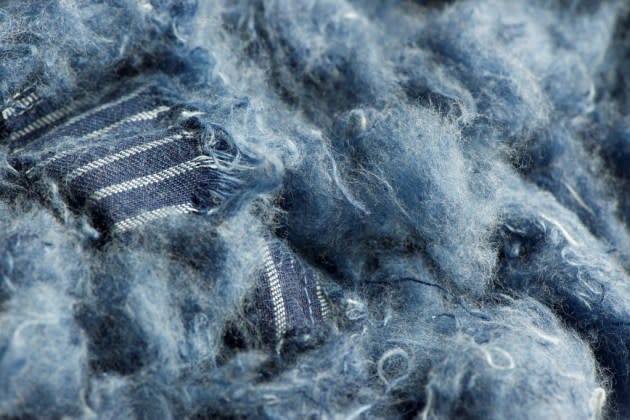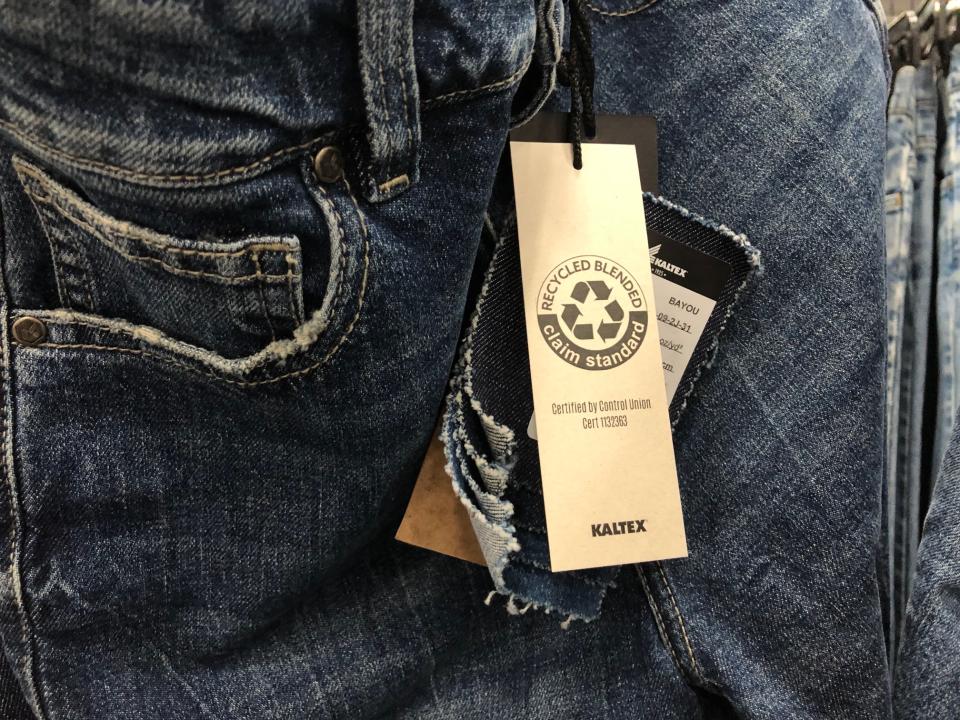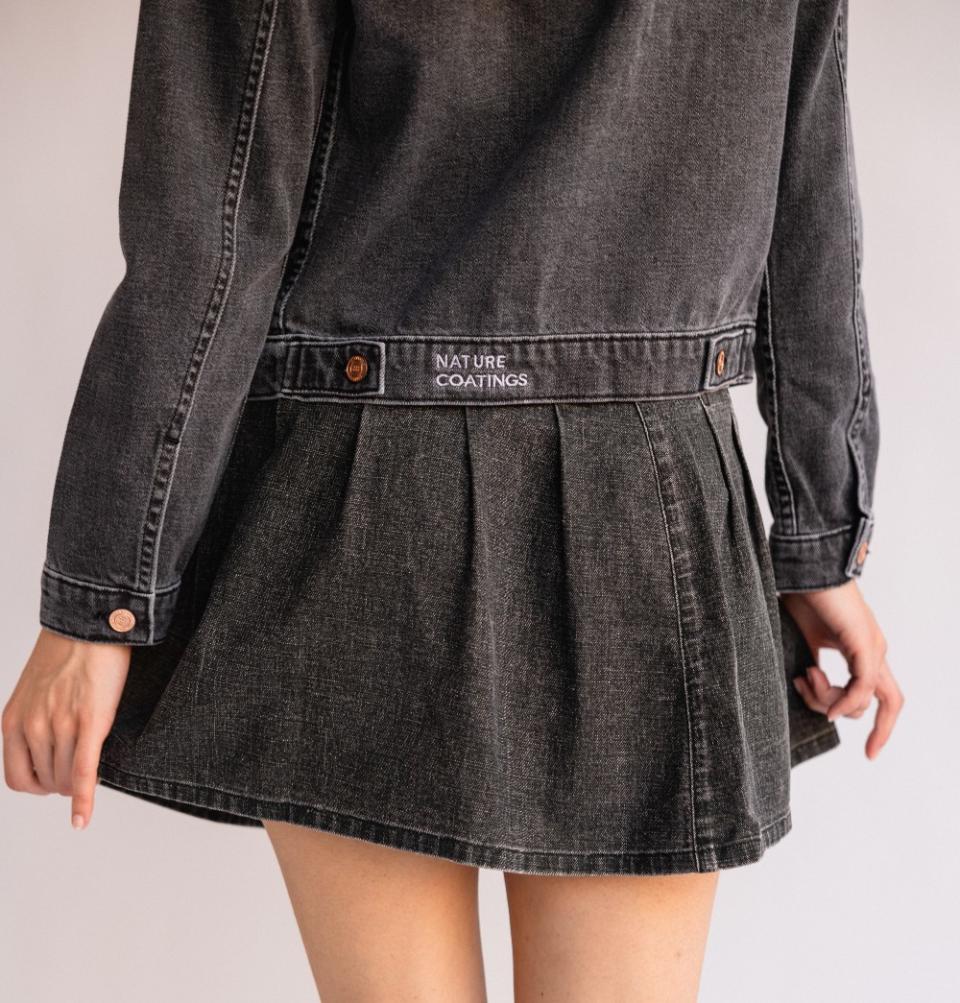Year in Review: How the Denim Industry Innovated Fibers, Dyes and Recycling in 2023

Sustainability underpins most new technologies and products from the denim supply chain.
In 2023, fiber producers and denim mills linked up to scale circularity—and they used blends, collaborations and new ingredients in the pursuit.
More from Sourcing Journal
Turkish mill Isko expanded its Ctrl+Z concept—a product range that reimagines its best-selling concepts like second-skin Jeggings and reshapes Isko Reform HP with recycled and regenerated content—to include specialty plant and animal fibers that give each fabric unique characteristics.
Ctrl+Z Blends includes plant-based Soya, lyocell, modal, and Naia acetate to create varying degrees of softness and sheen. Cashmere elevates fabrics with a soft, luxurious feel. Hemp and linen enhance fabric durability and add a robust look. The mill claims Ctrl+Z outperforms the market’s traditional and recycled denim products.

Artistic Milliners from Pakistan, Canatiba from Brazil and Textil Santanderina from Spain were among Lenzing’s long-standing partners that participated in its Fiber Recycling Initiative.
The trio kicked off the production of denim fabrics derived from mechanically recycled Tencel branded lyocell fibers. The mills are producing the recycled fiber from pre-consumer waste including yarn production waste and fabric scraps collected at their production facilities. They are converting the waste materials into raw materials for using in their production processes.
Virgin Tencel lyocell is made with a closed loop production process that transforms sustainably sourced wood pulp into cellulosic fibers with high resource efficiency and low carbon footprint. Mechanically recycled Tencel fibers adds to the sustainability features of the denim fabric, as it does not require usage of water or chemicals.
Later in the year, Lenzing and Artistic Milliners linked again to exclusively introduce 32MM, a new Tencel fiber that is optimized to create soft fabrications that have the authentic character of a classic cotton jean. The fiber’s unique structure allows Artistic Milliners to scale its use of recycled cotton in fabrics.
Compared to traditional Tencel, the shorter 32MM fiber has better compatibility with cotton and allows it to blend more cohesively with fibers of modest length. It also has a greater surface area, which allows more recycled fiber to bind to it.
Chinese mill Advance Denim, textile supplier Grace and textile recycler Renewcell came together to launch a denim fabric collection made with a 50-percent blend of Circulose denim pulp made from recycled textiles. The dissolvable pulp is the feedstock for manmade cellulosic fibers, and can be blended with other wood pulp fiber during production.
In this case, it was blended with Grace’s Gracell, a high-tenacity viscose produced by Yibin Grace, a producer with a Canopy Green Shirt rating denoting eco-friendly performance. The collection is intended to lend greater commercial visibility to circular viscose blend.
Other denim players are expanding their knowledge in recycling beyond making fabrics.
Mexican denim producer Kaltex joined forces with takeback solutions provider ReCircled to create the first vertical, transparent supply chain for circular denim in the Western hemisphere. Their exclusive strategic partnership will give fashion brands and retailers a channel for recycling unsellable goods, instead of sending them to landfill. Once ReCircled cleans and removes trims from the reclaimed denim, Kaltex will recycle the material content.

Isko’s parent company Sanko Group also bowed a new green-tech venture called Re&Up. Described as “game changer in textile-to-textile recycling,” Re&Up can recycle the majority textile waste inputs and has a proprietary technology especially for recycling polycotton waste, turning it into recycled cotton fibers, cellulosic powder, and fiber-grade polyester chips. Its operation in Turkey has the capacity to recycle1 million tonnes per year.
Turkish garment manufacturer Ereks-Blue Matters announced the launch of Rematters Textile Recycling Solutions, a consultancy that specializes in establishing circular value streams in the textile industry. Rematters supports clients in setting up textile recycling centers with technical and operational expertise and a network of input and output resources. The company’s goal is to cultivate a supply chain that champions textile circularity while driving significant benefits for the environment and clients’ financial performance.
Certifying claims of sustainability and implementing traceable technologies continued to gain importance.
Elevated Textiles-owned denim fabric manufacturer Cone Denim established a certified supply chain for recycled cotton in Mexico. This is in addition to both of its mills in Mexico already achieving Recycled Claim Standard (RCS) certification for fabrics.

RCS is used as a chain of custody standard to track raw materials through the supply chain. Cone’s RCS certification now includes a closed-loop process for recycled cotton, providing clients with verification and documentation of recycled cotton used in the manufacturing of Cone Denim fabrics in the Western Hemisphere.
Isko achieved the Bluesign-approved distinction for its circular material science innovation, Ctrl+Z. The certification is awarded only to Bluesign’s partner manufacturers that meet stringent safety and environmental requirements such as ensuring safe production sites, reducing CO2e emissions and water consumption, and avoiding hazardous substances in production among other criteria.
Bluesign is broadening its pool of possible partners, starting with the denim sector. In July, the Swiss material verification firm introduced “Bluesign Denim: A Sustainable and Responsible Choice,” an initiative it hopes will encourage mills, textile manufacturers and laundries to adopt ethical, eco-friendly practices.
Several mills worked with dye companies to scale sustainable solutions to make black denim.
Artistic Milliners, Orta and AGI Denim introduced fabrics dyed with Bio Awake, a denim dyed with BioBlack TX by Nature Coatings. The 100 percent bio-based, certified and carbon negative black pigment is a direct replacement for petroleum-based carbon black.

Developed as a green alternative to petroleum-based black-tone dye, the chemistry contains a proprietary pigment derived from industrial wood waste that comes from sustainably managed, certified sources. The carbon-negative black pigment dispersion’s unique blue undertone lends depth to a garment’s coloring, while also demonstrating superior lightfastness to conventional dyes, with an eight out of eight rating on the American Standard Test Measure scale.
The Leonardo DiCaprio-backed solution is free of fossil fuels and there are no detected PAHs and carcinogens in it, making it safe to touch and wear. There is no burning of the wood waste and no chemicals added in the manufacturing process.
Artistic Milliners and Textil Santanderina adopted Archroma’s Diresul Evolution Black dyestuff in 2023. Described as Archroma’s “cleanest sulfur black dye ever,” the product allows producers to achieve authentic black denim and washdown effects with a lower impact compared to standard Sulfur Black 1 liquid, which produces ammonia, sodium salts waste or liquid effluents.
The laser-friendly dye uses 58 percent fewer natural resources and produces less carbon dioxide during dye synthesis compared to standard black dyes, the company states. This reduces workers’ exposure to harmful compounds by 59 percent.

